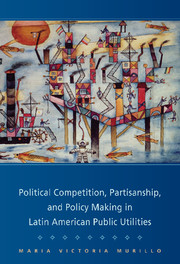Book contents
- Frontmatter
- Contents
- List of Acronyms
- Acknowledgments
- Introduction
- 1 Voice and Light
- 2 Political Competition and Policy Adoption
- 3 Casting a Partisan Light on Regulatory Choices
- 4 Postreform Regulatory Redistribution in Chile
- 5 Postreform Regulatory Redistribution in Argentina and Mexico
- 6 A Multilevel Analysis of Market Reforms in Latin American Public Utilities
- 7 Conclusion
- References
- Index
- Titles in the series
Introduction
Published online by Cambridge University Press: 05 June 2012
- Frontmatter
- Contents
- List of Acronyms
- Acknowledgments
- Introduction
- 1 Voice and Light
- 2 Political Competition and Policy Adoption
- 3 Casting a Partisan Light on Regulatory Choices
- 4 Postreform Regulatory Redistribution in Chile
- 5 Postreform Regulatory Redistribution in Argentina and Mexico
- 6 A Multilevel Analysis of Market Reforms in Latin American Public Utilities
- 7 Conclusion
- References
- Index
- Titles in the series
Summary
As democracy was returning to Latin America in the 1980s and 1990s, the citizens of the region's fledgling democracies experienced a paradoxical combination of expanding political rights and shrinking policy choice. Governments of different partisan orientations pursued market-oriented policies. Unsurprisingly, right-wing governments, such as Violeta Chamorro's in Nicaragua or Armando Calderon Sol's in El Salvador, adopted market reforms. Yet, unexpectedly, market-oriented reforms were also accomplished by populist parties that had previously promoted state-led growth and infrastructure nationalization, such as the National Revolutionary Movement (MNR) in Bolivia under Victor Paz Estenssoro, the Peronists in Argentina under Carlos Menem, or Democratic Action (AD) in Venezuela under Carlos Andres Perez. The decline of partisan differences in economic policy making seemed to render the vote inconsequential for economic policy outcomes in the new Latin American democracies.
One of the most symbolic transformations produced by this regional wave of market-oriented reforms was the policy shift of former champions of infrastructure nationalization into privatizers of the same services. Unexpected reformers included political parties that had nationalized public services, such as electricity and telecommunications, claiming the need to defend national sovereignty: nationalization and coverage expansion had been deemed crucial in these two sectors of utmost importance for economic development and the everyday life of households. In the aftermath of the 1980s debt crisis, however, under pressure from financial shortages and technological underinvestment, the formerly populist parties joined their right-wing rivals in seeking to attract private capital and management to these two sectors characterized by capital intensity and technical complexity.
- Type
- Chapter
- Information
- Political Competition, Partisanship, and Policy Making in Latin American Public Utilities , pp. 1 - 15Publisher: Cambridge University PressPrint publication year: 2009



